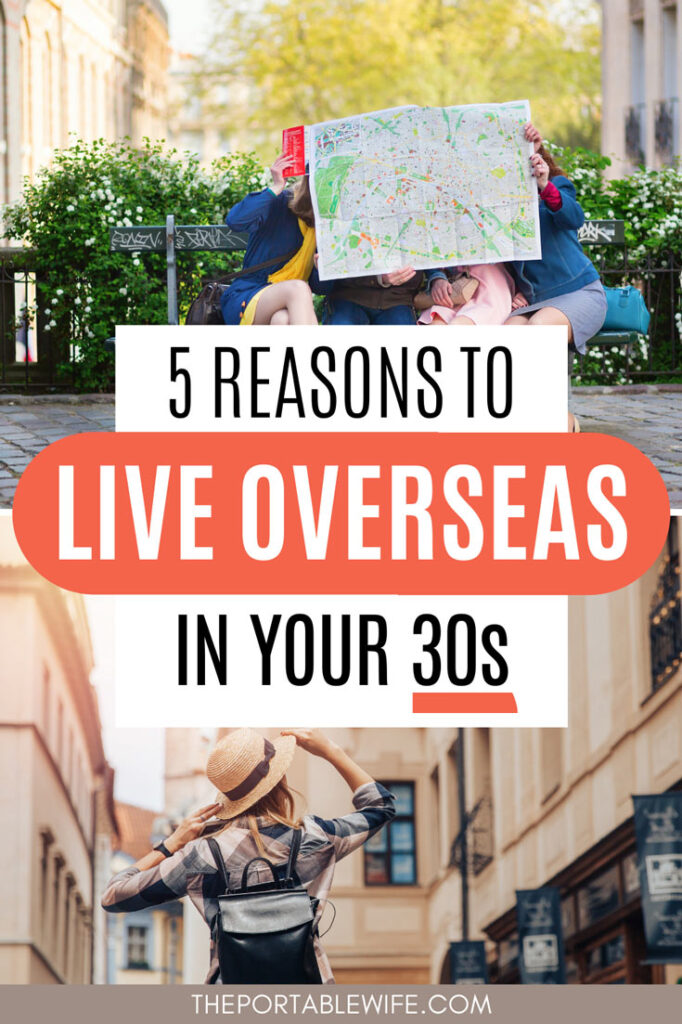Worried you’re too old to live abroad? Moving overseas after 30 was the best decision of my life–and it might be yours, too.

Ever since I was a little girl, I dreamed of living in Europe. Thanks to a love of adventure books and the wonderful Samantha Brown–host of The Travel Channel’s Passport to Europe–I often envisioned my adult self curled up with a novel in a cozy, firelit pub or strolling along the Seine with a fresh crepe in hand.
Europe seemed so inviting, so delicious, and so well-connected. And I knew that one day, I had to live in one of the continent’s magical cities. In 2018, that dream became a reality when my husband and I moved to London from the US.
Many young adults who have similar dreams get this experience by studying abroad. I envy those people.
While my university did have numerous programs to study in Europe for a semester or a full year, I didn’t have the money to make it happen. Heck, I couldn’t even afford to travel abroad until I was 25!
Maybe you faced a similar dilemma, and now you’re “middle-aged” and wondering if moving abroad after 30 is foolish and whimsical.
Well, there’s a reason this is one of my favorite quotes:
You’re never too old to set another goal or to dream a new dream.
— C.S. Lewis
There are tons of advantages to living abroad at any age. But here are some that are particularly relevant to people moving overseas after 30.
#1. You can afford more luxuries

When you imagine yourself living abroad, what do you see?
I’m betting it involves some travel, maybe drinks at an outdoor cafe, perhaps even a charming apartment with a lovely view… But while fantasies are free, the reality is that all of these things cost money. And when you’re in your 20s, that resource is often scarce.
I know plenty of people who hated living in London in their early 20s because they could barely afford a tiny room on the outskirts of town, let alone drinks at the pub or tickets to a show. It’s hard to fully take advantage of living overseas if you’re on a shoestring budget.
I spent a fair bit of my 20s living cheaply and paying off my student loan debt. If you’re an American, you may be looking at 10 years of big payments taking a bite out of every paycheck.
But once that debt is lifted, you’ll (hopefully) have far more disposable income. And that’s in addition to your increased earnings as you get more established in your career.
#2. It’s easier to find a good job
Speaking of careers, it’s far easier to find quality, good-paying jobs abroad once you have solid work experience on your resume.
Digital nomads and spouses aside, many people moving abroad in their 30s work for foreign companies, whether it’s for visa sponsorship or simply to make a living. And as a foreigner, you’re already at a significant disadvantage compared to locals applying for the same position.
But having a decade of industry experience gives you an edge, and opens up doors that are closed to younger candidates. You’ll have the skills to apply for a wider range of positions instead of competing for an entry-level job.
And depending on the company you currently work for, moving overseas in your 30s might be easier than you realize.
Many global businesses from tech to consulting to pharma have transfer programs in place that allow–or even encourage–employees to transfer to an overseas office. This is how my husband and I were able to move to the UK.
#3. You have more confidence and common sense

Sure, living abroad in your 20s has its benefits. The energy, optimism, and willingness to try unusual things all make for an interesting lifestyle. You might be able to party until 2am every weekend or live in a tiny shared apartment with complete strangers.
But people moving overseas after 30 have something else going for them: life experience.
One of the biggest challenges of living in a foreign country is that, as an outsider, you are an easy target for scams. I’ve heard countless stories from fellow expats and digital nomads who’ve been swindled (or nearly so) by shady landlords and fake job postings. And that’s only the beginning.
Being a foreigner also means you aren’t familiar with how things work. This opens you up to not only being scammed, but also making ill-informed choices out of ignorance.
For example, there are all sorts of laws in the UK that protect renters. One of these laws states that landlords must remedy mold and damp problems in their properties, or else they’ll be fined and possibly prosecuted.
Unfortunately, many foreigners aren’t aware of this rule, and landlords will refuse to fix the property in the hopes that the tenants won’t fight them on it. And even if the tenants know the rules, they may be afraid of getting evicted for bringing up issues, and so they stay quiet.
So what does all this have to do with living overseas in your 30s? In a word, confidence.
Most fresh-faced recent college grads don’t have the experience to sniff out a scam, or the guts to challenge authority figures. But the older you get, the better your “B.S. meter” becomes–and you aren’t afraid to call people on it.
Save me for later!
#4. There’s less pressure to conform
Are you unmarried? Do you not have children? Is your job not a traditional 9-5?
If you answered “yes” to any of these questions, chances are your social circle has opinions about how you’re living your life. And they’ve probably made those opinions clear (more than once).
We face enormous pressure to conform to family and societal expectations. But what happens when you move 1,000 miles away from home?
While I can’t promise the questions about your future will stop, they should become far less frequent. Plus, you won’t be surrounded by “silent” pressures, like birthdays or holiday gatherings where you’re the odd one out for being single and childless.
Additionally, you’ll be a cultural outsider once you’re in your new country. While you need to follow the rules and avoid big taboos, you won’t be held to the same lifestyle expectations as a local would. It doesn’t mean people won’t judge you–that happens everywhere in the world–but you’re more likely to get a pass.
RELATED: Expat vs Immigrant vs Digital Nomad: Which Term to Use?
#5. You can live without regrets and “what if’s”

Of all the reasons to live abroad in your 30s, this one is the most impactful.
We love to mourn what could have been. “If only I’d majored in Computer Science… If only I’d gone on that date with Tom Brady…”.
Why add another life-changing event to that list?
Making the leap overseas takes courage (and lots of preparation). But it also means you won’t get caught up in the “what if” fantasy when things get tough down the road.
To end with another one of my favorite quotes:
Twenty years from now, you will be more disappointed by the things you didn’t do than by the ones you did.
— Mark Twain
Want to learn more about moving abroad? Check out these posts:
- How to Move Out of America in 10 Steps
- Ultimate Moving Abroad Packing List
- Life of an Expat: 7 Truths You’ll Face Abroad

Want more travel + relocation tips?
Become a member of my Patreon group for exclusive access to my resource library, including:
- Printable packing lists for moving + travel
- Money-saving tips
- Insider travel guides
- And much more



